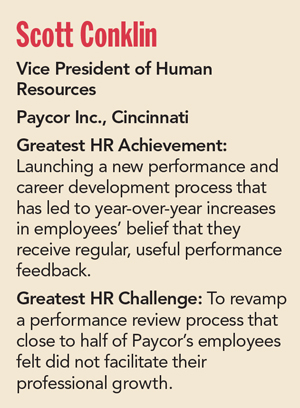This article accompanies The Fixers.
Scott Conklin has spent more than a decade in the human resource profession. But he didn’t really think of himself as an HR professional when he took his first HR-related job in 2005, as an organizational-development consultant at Convergys Corp. In that position, his duties included managing the organization’s talent-review tools, processes and data, as well as the development and use of talent-management software to drive the identification and movement of talent across the business.
“I was in the realm of HR, but I didn’t really think of it that way then,” says Conklin, who is now the vice president of human resources at Paycor Inc. “I was in organizational design, and working with technology. I liked the learning piece of the job, and figuring out how to get the organization and its people to perform better.”
Improving organizational and individual performance is a big part of his current role with the Cincinnati-based provider of HR, payroll and timekeeping software. His knack for identifying areas in need of improvement – and the ability to marshal people and resources to make the needed adjustments – is a big reason why he’s one of this year’s Rising Stars.
In October 2015, for example, an internal engagement survey revealed that only 44 percent of Paycor employees felt that the company’s performance-management system facilitated their career growth.
In response, Conklin assembled and led a “Tiger Team” at Paycor that was comprised of high-potential associates from all levels of the organization. The group reinvented the company’s performance-management process by moving away from annual reviews and creating the quarterly “Connect” process that focused on more frequent performance and career- development feedback and planning.
Getting the Right Players
Conklin notes that “we were very specific in terms of who we asked to be on this team.
 In addition to building a team that reflected the age demographics of Paycor’s workforce – 52 percent of Paycor’s current employees are millennials – Conklin sought to make inclusion on the team attractive on two fronts.
In addition to building a team that reflected the age demographics of Paycor’s workforce – 52 percent of Paycor’s current employees are millennials – Conklin sought to make inclusion on the team attractive on two fronts.
“We wanted to learn from them and use their input to design something that would fit their needs as well as [those of] their colleagues in the company,” he says. “But we also wanted to make them feel that it was really cool to be on this team” by stressing that inclusion in this exclusive, hand-picked group would be a tremendous growth opportunity, not to mention a nice addition to a resume.
“We wanted to create a process that increased engagement throughout the organization, but we also saw this as a way to further engage the high potentials on this team.”
After conducting external research on best practices regarding performance-review processes and soliciting associate feedback, Conklin and the team brought in employees and managers for a one-day meeting to discuss current processes and how they could be bolstered.
“For example, we asked participants about the frequency with which they’d like to receive feedback, and who they would want to hear it from – peers, their bosses, or a combination of both,” recalls Conklin.
The Connect performance-review system that was borne out of such conversations “is actually the conversation [an employee has] with his or her manager, or peers, about performance,” Conklin continues. “It’s not about making performance reviews an annual-type thing. It’s about letting employees know how they’re doing right now, and letting them know what they need to succeed.”
Conklin describes his role in launching Connect as “defining the problem, setting the vision, getting it rolling and then getting the hell out of the way.” The role of the HR and talent development teams, meanwhile, is to continually seek ways to fine-tune the Connect concept, he adds.
“I’m a participant in the dialogue,” Conklin says, “but my viewpoint doesn’t carry any more weight than anyone else’s does.”
Conklin’s willingness to solicit the opinions of others to inform decisions has helped make him “a man of the people,” says Karen Crone, Paycor’s chief human resources officer and Conklin’s manager.
“Scott is well-respected by associates from all levels, from the CEO to the newest associate,” she says, adding that he is “in the succession queue for Paycor’s CHRO position.”
Conklin’s efforts have also reaped measurable improvements in the company’s talent processes, with the implementation of Connect linked to a 10-percent year-over-year increase in the number of Paycor employees reporting that they now receive more frequent, useful critiques of their performance. Employee surveys have shown a 9-percent spike in the number of workers who feel the Paycor performance-management system aids their career growth.
Conklin has provided “great insights about the realities of work/life at Paycor, from his boots-on-the-ground relationships with associates,” says Crone, noting that he is also “actively building” a workforce-planning practice that will help Paycor look ahead 18 months and plan for the skills the organization needs as it continues to grow.
“Above all,” she says, “he’s achieved tangible results that have shaped and maintained Paycor’s strong culture during a period of hyper-growth.”

